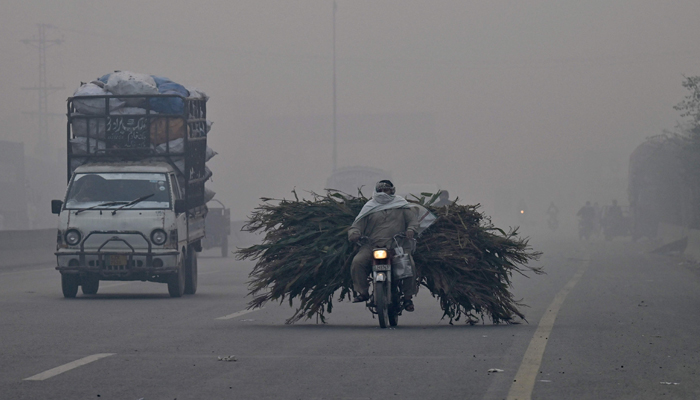‘Coal-based power generation in India, Pakistan main cause of smog’
ISLAMABAD: The coal-based power generation in India and Pakistan is the main cause of increasing air pollution that has exposed both countries to dense smog putting the lives of the people at risk.
Arshad H Abbasi, an eminent energy expert said this while talking to The News. He said that he wrote a letter to the Punjab chief minister, chief secretary Punjab, and secretary of the Environment Protection Department offering his services to resolve the painful issue of smog. However, Abbasi said he didn’t receive any response from the Punjab government knowing the fact that health issues including asthma, lung damage, throat infections, stroke, heart problems, and shortened life expectancy are being brought on by heavy and prolonged exposure to hazardous air. He argued that the persistence and intensity of the haze currently enveloping parts of the country is the effect of the deeper problem of air pollution.
Though automobile emissions, burning of dried leaves, and other polluting activities are contributors, the single biggest factor that emerges on the scene is the use of coal for the generation of electricity in thermal power plants. The phenomenon of persisting fog during December and January has been increasing in Pakistan over the past 15 years. Its range also includes the Indo-Gangetic plain that stretches from Peshawar to Kolkata and beyond. The single largest contributor to air pollution in South Asia is coal-run thermal power generation.
The consumption of coal in South Asia during 2012 was around 685 million tons in total, out of which 98pc was used in India. The majority of this coal was consumed by the power sector. The share of electricity generated using coal as fuel in India is 71pc, 3.2pc in Bangladesh, and 0.1pc in Pakistan. A report by the Centre for Study of Science, Technology, and Policy in Bangalore reveals that the quality of Indian coal is very poor, with 35-45pc ash content and low heating value. Thus, the generation of one unit of electricity emits one kilo of carbon dioxide, annually, almost 200 million tons of ash are generated by coal in the power sector.
Pakistan needs to follow the ASEAN agreement to come up with a ‘Transboundary Haze Pollution’ model in South Asia. At the same time, other countries including Bangladesh, Bhutan, the Maldives, Nepal, and Sri Lanka, have to find the courage to ask India to end coal-based power generation.
-
 Natalie Dormer's Reaction To Sarah Ferguson's Epstein Links Resurfaces After 'The Lady' Release
Natalie Dormer's Reaction To Sarah Ferguson's Epstein Links Resurfaces After 'The Lady' Release -
 Did You Know Famous Windows 10 Background Was Shot In Real Life? Here's Story
Did You Know Famous Windows 10 Background Was Shot In Real Life? Here's Story -
 Pete Davidson's Baby Mommy Elsie Hewitt Reveals Why She 'hated' Being Pregnant
Pete Davidson's Baby Mommy Elsie Hewitt Reveals Why She 'hated' Being Pregnant -
 Harry, Meghan Show Royal Family How To Make Impact Without Public Money
Harry, Meghan Show Royal Family How To Make Impact Without Public Money -
 Hillary Clinton Set For Deposition Before House Committee Today In Jeffrey Epstein Investigation Case
Hillary Clinton Set For Deposition Before House Committee Today In Jeffrey Epstein Investigation Case -
 Samsung Galaxy S26 Ultra Debutes With Display That Blocks Side Viewers
Samsung Galaxy S26 Ultra Debutes With Display That Blocks Side Viewers -
 Fans In Shock As 'Smiling Friends' Creators End Cult-favourite Sitcom On Adult Swim: 'They Did It On Purpose'
Fans In Shock As 'Smiling Friends' Creators End Cult-favourite Sitcom On Adult Swim: 'They Did It On Purpose' -
 Meghan Markle Accused Of Mimicking Kate’s Iconic Style On 'pseudo Royal Tour'
Meghan Markle Accused Of Mimicking Kate’s Iconic Style On 'pseudo Royal Tour' -
 Social Media Addiction ‘like Smoking’: Mumsnet Calls For Under-16s Ban With Cigarette-style Warnings
Social Media Addiction ‘like Smoking’: Mumsnet Calls For Under-16s Ban With Cigarette-style Warnings -
 Andrew Mountbatten, Virginia Giuffre's Photos Attached To Buckingham Palace Gates
Andrew Mountbatten, Virginia Giuffre's Photos Attached To Buckingham Palace Gates -
 Everything We Know About Bruce Willis Frontotemporal Dementia
Everything We Know About Bruce Willis Frontotemporal Dementia -
 Singapore's Grab Plans AI-driven Expansion And New Services To Boost Profit By 2028
Singapore's Grab Plans AI-driven Expansion And New Services To Boost Profit By 2028 -
 Adele Reveals How She 'snapped Out Of' Sever Postpartum Depression
Adele Reveals How She 'snapped Out Of' Sever Postpartum Depression -
 ‘Chinamaxxing’ Explained: Inside Viral Gen Z Trend Taking Over TikTok And Instagram
‘Chinamaxxing’ Explained: Inside Viral Gen Z Trend Taking Over TikTok And Instagram -
 Fears Erupt About Sarah Ferguson Pulling A ‘Harry’ While Sitting On A King’s Ransom: ‘Her Leverage Still Stands’
Fears Erupt About Sarah Ferguson Pulling A ‘Harry’ While Sitting On A King’s Ransom: ‘Her Leverage Still Stands’ -
 Lisa Rinna Slams Andy Cohen For His Below The Belt Move: 'So Shady'
Lisa Rinna Slams Andy Cohen For His Below The Belt Move: 'So Shady'




